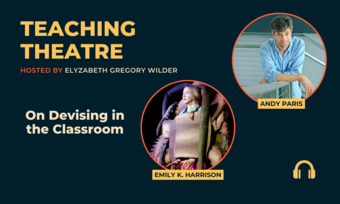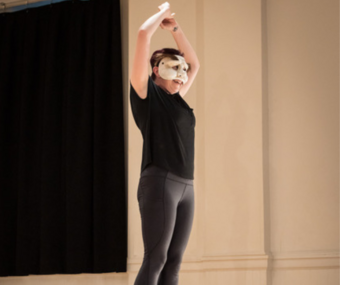To BA or not to BA? That is the Question
Prologue
"What is your major?" is the second question anybody asks in college. Each time an Engineering or Biology major asked me this, I hesitantly muttered "Theatre." I felt the need to justify my place, and even question whether I'm wasting my time by studying theatre in a university setting.
Act 1: In the Limelight
To set the scene, it was 2014 and I was freshman year. It was only one week into the school year and auditions were starting. I was nervous and unprepared for my first college audition, but signed up for generals anyways. Two days later, I went in with a piece I'd written myself—huge mistake! Three lines into the monologue, I forgot everything. Then, as if I'd suddenly forgotten everything I uttered the two forbidden words in auditions: "I'm sorry." After that everything was a blur. A stage manager handed me a slip of paper with the link to the callbacks lists. The lists would be tortuously posted at midnight. I left the audition feeling terrible. I held back tears as I walked to my dorm, grabbed my bag of off-brand animal crackers, and walked to my sister's apartment. As she opened the door, I broke down. I was crying, eating, and eventually laughing. Welcome to college theatre.
I'm not going to pretend I wasn't at a disadvantage from the beginning. I came from a high school with a microscopic theatre program. Every year we put on two shows. All of the plays I'd been in were by Pioneer Drama. Most of them were painfully cheesy comedies, which could have been written by a middle school student. Students had no opportunities to get hands-on experience. And my teacher, while she cared for the students, put minimal effort into the productions. This all left me with a disadvantage from the students who had trained for years and had hands-on experience.
Entering college theatre as an actor is like being thrown into a cage full of ravenous wolves. It is a constant competition for attention. You have to come in ready to join the fray. Beginning as an actor with training and experience is the only way to enter without being torn to bits. The more experienced and known actors will more likely get the role than an unknown with no training. Since that first audition, I've taken two acting classes and been in two plays. However, as with community and professional theatre, more experience and a BA is never a guarantee of being cast.
As an actor coming from a lacking theatre program, the guidance and community of my theatre classes were useful. While I wouldn't consider myself Meryl Streep, the classes helped me to hone in on my technique. However, I don't want to ignore the fact that acting classes are offered off college campuses. An actor looking for experience may be more likely to fill their resume faster outside of a university environment than enduring four years of General Education credits and major requirements.
Every theatre program is different. Every theatre teacher is different. Every artist is different.
Act 2: Behind the Velvet Curtain
One of the benefits to attending a public university to study theatre is the hands-on experience. In only two years, I've had the opportunity to be on costume crew, operate the sound board, stage manage, design props, direct, and write. Attending public theatre has allowed me to try new things. I study under working professionals who teach me the craft and give me the creative freedom to make choices. Outside such a structured learning environment, I would've never had such a safe space to develop my technique and explore the other elements of production.
A designer seeking experience could potentially seek professional designers and learn by entering the field. However, jumping in with no experience and no connections will be challenging. A university program is a steam cooker for artists. I am surrounded by working artists, who are educated about the dead artists, which allows me to develop my talents as an emerging artist. When entering the world of theatre, the best currency you have are names.
Act 3: Exploring the Culture and Theory of Theatre
Studying theatre in a university program has also allowed me to explore other forms of theatre that I may not have thought to explore. As a student I've been a part of an Indonesian dance class. I came to an understanding of the practice and aesthetics of another culture's art form. I learned to appreciate the culture. And I also came to appreciate theatre as a global form of communication. In addition, I've been fortunate to take one of the university's most popular courses on Monsters in theatre. This class taught me about theatre as an important component of the human identity. Had I not attended college, I may never have been exposed to this way of thinking about theatre.
Epilogue
This is a question that is impossible to answer objectively. Every theatre program is different. Every theatre teacher is different. Every artist is different. This blog isn't as much a guide to choosing. Rather it is a collection of observations and musings by one theatre student from one theatre program at one college. And, as someone who has enjoyed her time in college theatre, this blog is doomed to be biased. I'm not afraid to tell people my major anymore, which must mean that there is some justification for me being here. To all of the hopeful actors, designers, playwrights, dancers, and dramaturgs: this is not a question I can answer for you. I can only share my experience in hope each of you make the decision that feels right to you.











Comments
The article is just the start of the conversation—we want to know what you think about this subject, too! HowlRound is a space for knowledge-sharing, and we welcome spirited, thoughtful, and on-topic dialogue. Find our full comments policy here
brava bravo - and thank you for sharing the challenge of being an undergrad who is NOT in a conservatory program. The desire to pursue and sustain ones dreams, ambitions and desires outside of the more approved course/major tracks of colleges/universities is always a difficult road to hoe. We who labor in the hallways, basements, design labs and classrooms of theory/praxis welcome your story.